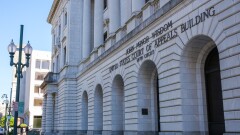Rohit Chopra, the director of the Consumer Financial Protection Bureau, is ending 2022 on a high note after striking a multi-billion-dollar settlement with Wells Fargo.
Chopra has repeatedly said that the CFPB is looking for the worst types of repeat offenders. The $3.7 billion enforcement action against Wells proved that Chopra is not just spouting rhetoric — he intends to hold repeat corporate offenders accountable.
Among the U.S. financial regulators, Chopra is the one individual who bankers most fear. In 2023, he is expected to continue to be a thorn in the industry's side. The bureau will also remain in the news with a potential constitutional challenge to its funding mechanism likely to be accepted and heard by the Supreme Court.
In addition, Chopra will face more legislative scrutiny as Republicans take control of the House Financial Services Committee. Rep. Patrick McHenry, R-N.C., who is the committee's chairman-elect, has said he will pursue "
After announcing the Wells Fargo action, Chopra showed chutzpah by warning that the $1.9 billion-asset bank is "not out of the woods" because
Fourteen months into Chopra's term as CFPB director, here are five major areas to watch in the year ahead.







